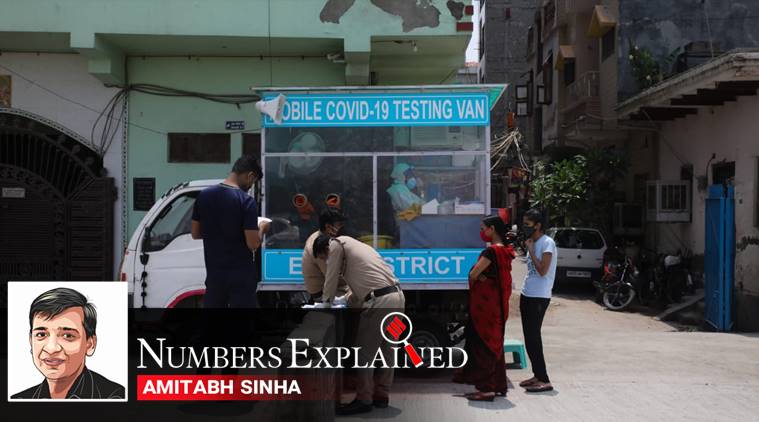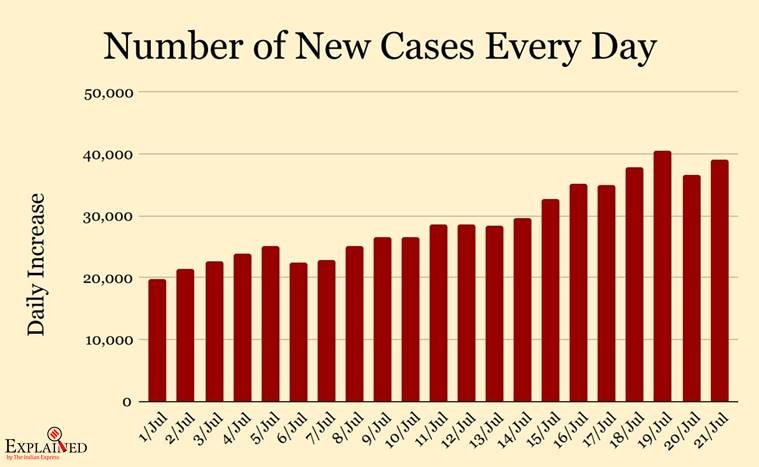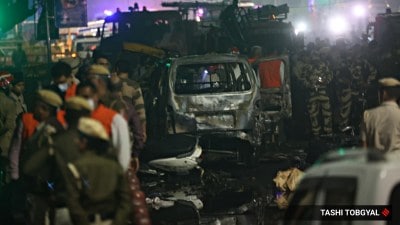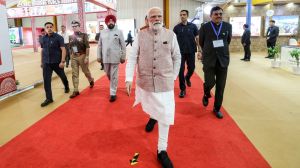India coronavirus numbers explained: How to read the serological survey results from Mumbai, Delhi
India Coronavirus Cases: Serological tests, that look for disease-specific antibodies in an individual, are carried out to estimate the spread of the disease in a population group.
 Health workers in a mobile Covid-19 testing van take swab samples of the public in New Ashok Nagar, New Delhi, on July 21, 2020. (Express Photo: Abhinav Saha)
Health workers in a mobile Covid-19 testing van take swab samples of the public in New Ashok Nagar, New Delhi, on July 21, 2020. (Express Photo: Abhinav Saha)
India Coronavirus Cases: Results of two different serological surveys, one in Delhi and the other in Mumbai, were announced on Tuesday. Both the surveys found the presence of novel Coronavirus-specific antibodies in slightly less than 25 per cent of those tested. This could mean that in either of these cities, there were chances that about 25 per cent of the city’s population had already been infected by the virus, if we assume that the disease was uniformly spread in the population.
Serological tests, that look for disease-specific antibodies in an individual, are carried out to estimate the spread of the disease in a population group. Since it is not possible to do a diagnostic test on everyone, the real number of people infected by the disease is not known, especially since most of the patients are known to be asymptomatic. Health authorities therefore depend on serological tests to estimate this number.
A serological survey is done to detect the presence of specific antibodies, and is used to assess the prevalence of a disease in the population. The test indicates past infections (and which triggered an immune response), and is not used to detect active infections.
Every infected person, whether symptomatic or otherwise, develops antibodies against the disease. And these antibodies remain within the person for a prolonged period, possibly for a few months. Detection of these antibodies means the person has been infected with the disease at some stage.
Knowing the actual extent of disease spread is critical for several reasons. It helps authorities make informed decisions about the interventions to be used in order to contain the disease. It also gives them a better understanding of how dangerous the virus is, because a truer estimate of fatality rate and patients needing critical care can be reached.
Also read | Virus is now widespread in smaller states
For example, the positivity rate in Delhi right now is 14.9 per cent, meaning 14.9 per cent of people who have been tested have turned out to be positive. If everyone was tested, this would be the same as the overall prevalence of the disease in the population. But everyone has not been tested, and is not likely to be ever tested, and therefore, the 14.9 per cent number might not be an accurate representation of the disease spread. The latest round of serological survey in Delhi suggests that the disease could be much more widespread than what the positivity rate suggests.
The serological survey in Delhi tested 21,387 people, and found that 22.86 per cent of these had developed antibodies against Covid19. In Mumbai’s case, 9,590 individuals were tested, and antibodies were detected in 24.3 per cent of them. (Read the key takeaways from Delhi’s serological survey)
However, how well can these numbers be extrapolated to the entire populations depend on how representative the survey sample was, and how uniformly is the disease spread in the population. So, like many other parameters in this pandemic, estimates of disease prevalence are also indicative.
Meanwhile, Delhi, which had reported less than 1,000 cases on Monday for the first time since June 1, saw a marginal rise on Tuesday, with 1,349 new infections getting detected.
📣 Express Explained is now on Telegram. Click here to join our channel (@ieexplained) and stay updated with the latest
Top ten states with maximum caseload:
| STATE | TOTAL POSITIVE | NEW CASES | TOTAL RECOVERIES | DEATHS
|
| Maharashtra | 327,031 | 8,336 | 182,217 | 12,276 |
| Tamil Nadu | 180,643 | 4,965 | 126670 | 2,626 |
| Delhi | 125,096 | 1,349 | 106,118 | 3,690 |
| Karnataka | 71,069 | 3,649 | 25,459 | 1,470 |
| Andhra Pradesh | 58,668 | 4,944 | 25,574 | 758 |
| Uttar Pradesh | 53,288 | 2,128 | 31,855 | 1,299 |
| Gujarat | 50,465 | 1,026 | 36,403 | 2,201 |
| Telangana | 47,705 | 1,431 | 36.385 | 429 |
| West Bengal | 47,030 | 2,261 | 28,035 | 1,182 |
| Rajasthan | 31,251 | 983 | 22,629 | 577 |
But the sharpest rise continued to come from Andhra Pradesh, which reported close to 5,000 new cases on Tuesday. Andhra Pradesh, the fastest growing state in the country right now with a daily growth rate of 8.5 per cent, now has over 58,000 confirmed infections. Almost 45 per cent of the state’s total caseload has been added in just the last one week.
Odisha reported more than 1,000 cases for the first time. The state now has close to 20,000 confirmed cases and is growing at almost 4.2 per cent every day.
 The number of daily new cases since July 1.
The number of daily new cases since July 1.
Across the country, a little less than 38,000 new cases were detected on Tuesday, taking India’s total caseload to 11.93 lakh, of which 7.53 have recovered from the disease.





- 01
- 02
- 03
- 04
- 05

































